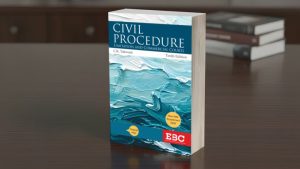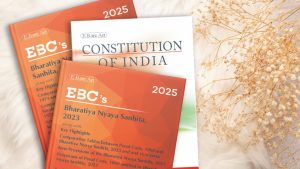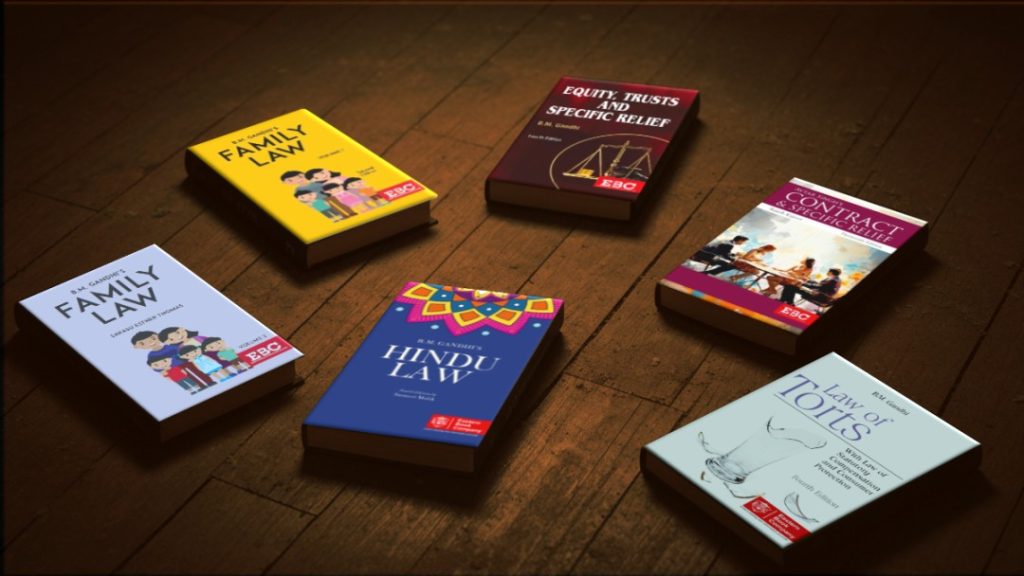
Civil Procedure (CPC)
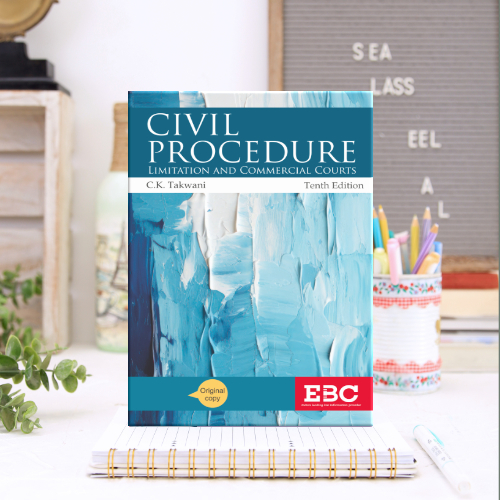
Civil Procedure (CPC) by C.K. Takwani offers a clear, logical study of civil procedure principles.
- Covers Civil Procedure and Limitation Law in India with academic and judicial references.
- Includes latest legislative updates and rulings from Supreme and High Courts.
- Detailed coverage of jurisdiction, pleadings, discovery, trial, and Commercial Courts.
- New section added on Mediation Act, 2023.
- Written for students and junior lawyers; widely prescribed in Indian universities.
- Also serves as a valuable resource for practicing lawyers and judges.
Law of Torts
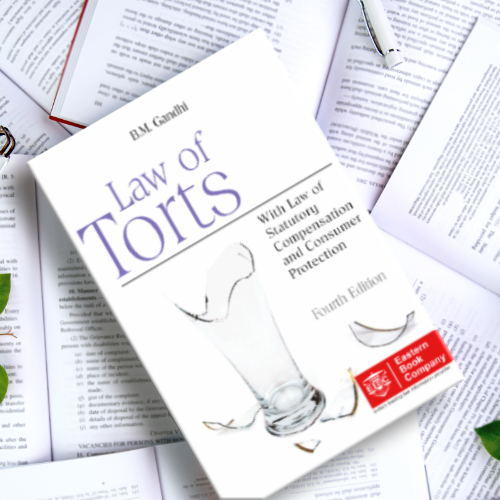
This edition is carefully prepared to align with the new Bar Council of India syllabus and is widely used in law colleges.
- The popular work has been reprinted due to high demand, and fresh orders are welcome.
- Part I covers general principles of tort law, including history, definitions, liability, and remedies.
- Part II explains specific torts such as trespass, defamation, negligence, nuisance, and economic torts.
- Part III focuses on statutory compensation related to torts.
- Part IV deals with the Consumer Protection Act, 1986, highlighting its key provisions.
- A detailed subject index is included for easy navigation and reference.
Simply, Legal! Torts

Shweta Vishwanathan’s Torts from EBC’s Simply, Legal! series makes the fundamentals of Tort Law accessible and engaging for all readers.
- The book uses a simple, conversational narrative style with effective illustrations to explain complex legal concepts.
- It is divided into 17 chapters covering key topics like Vicarious Liability, Nuisance, Negligence, Defamation, and more.
- The content ranges from the basics of “What constitutes a tort?” to legal damages and remedies.
- Everyday examples link principles of Tort Law to real-life situations, showing law’s relevance in daily life.
- The book helps readers think like lawyers by applying legal principles to practical scenarios.
- Suitable for beginners, lawyers, and judges, it serves both as an introduction and a refresher on Tort Law fundamentals.
Avtar Singh’s Law of Contract & Specific Relief

Avtar Singh’s Law of Contract and Specific Relief is a highly respected and authoritative text, widely used by students and legal professionals.
- The book explains complex contract law topics in a clear and straightforward style, covering important practical and academic areas.
- The 13th edition, revised by Prof. Rajesh Kapoor, includes recent case laws and statutory changes, notably the Specific Relief (Amendment) Act, 2018.
- The 2018 amendment shifted specific performance from an exception to the general rule, granting courts broader discretion and introducing substituted performance.
- Courts are now empowered to engage experts on specialized issues under the new amendment.
- A new feature is the chapter-wise list of select articles from law journals, accessible via SCC Online™ Web Edition.
- The book is praised by students, lawyers, judges, and academicians, reflecting the author’s rich experience and practical approach.
Equity, Trusts and Specific Relief alongwith a chapter on Fiduciary Relationships

This book thoroughly explores the evolution and application of the principles of equity in India, highlighting its significance in legal interpretation and practice.
- The author traces the development of equity principles, explaining their aim, role, and necessity in interpreting statutes related to property, contracts, mortgages, trusts, and more.
- Equity principles, based on justice and conscience, impose liability in cases where statutes are silent, extending also to tort law.
- The book compares Indian equity principles with English law, providing a broader perspective.
- A new chapter on Fiduciary Relationships has been added, covering its definition, origin, and relevant case law.
- Recent cases on parens patriae jurisdiction over trusts, trustee actions, specific performance, and unjust enrichment are included.
- Important rulings on specific performance are highlighted, supported by an elaborate subject index and table of cases for easy reference.
B.M. Gandhi’s Family Law Volume 1
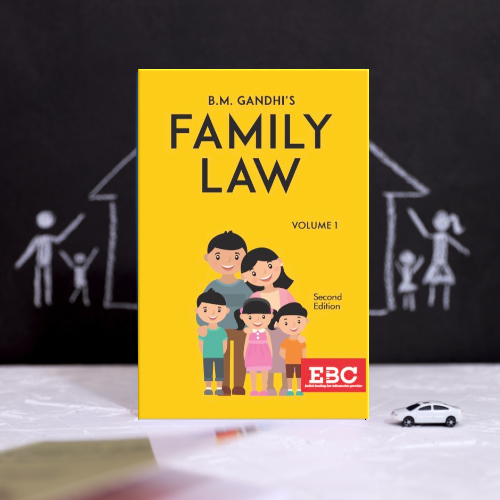
Volume 1 of B.M. Gandhi’s Family Law is thoroughly revised, updated with the latest case laws and statutes, making it a comprehensive resource on both codified and uncodified family law.
- Updated chapters on divorce, maintenance, and custody reflect recent legal developments and case laws.
- New cases on topics like bigamy, adultery, fraud, coercion, and custody awards (to mothers, fathers, and grandparents) are included.
- Covers recent laws and judgments on Triple Talaq, live-in relationships, and same-sex relationships.
- Features short, accessible chapters and detailed discussions of statutory and customary laws for easy navigation.
- Key cases are highlighted throughout the book for quick reference.
- Additional online learning resources available on www.ebcexplorer.com, including case law access, discussion forums, and relevant articles.
B M Gandhi’s Family Law Volume 2

Volume 2 of B.M. Gandhi’s Family Law, revised by Dr. Sarasu Esther Thomas, offers an updated and comprehensive guide to codified and uncodified family law with the latest case laws and statutory changes.
- Updated case laws on Joint Hindu Families, women as karta, widows’ property rights, and rights of dependents.
- Expanded definition of “Hindu” to include all citizens except Muslims, Christians, Parsis, and Jews.
- Covers devolution of property of female coparceners and interests in traditional family units like tarwad and illom.
- Explains differences between Mitakshara and Marumakkattayam schools, and Shia and Sunni succession laws.
- Highlights the role of family courts and importance of in-camera sittings.
- Features short, accessible chapters with detailed topic-wise discussions and highlighted key cases for easy reference.
B.M. Gandhi’s Hindu Law

This scholarly work offers a comprehensive and in-depth analysis of Hindu law, covering both codified and uncodified aspects.
- Covers essential topics such as Hindu marriage, child marriage, divorce, maintenance, succession, adoption, and guardianship.
- Explores key judicial pronouncements including a daughter’s right to coparcenary property and aspects of the Hindu Undivided Family (HUF).
- Discusses both statutory and customary laws in detail, reflecting the complex nature of Hindu law.
- Written in simple, easy-to-understand language suitable for students and legal professionals alike.
- Incorporates significant case law references to clarify and support legal principles discussed.
- Includes a detailed subject index for quick and efficient reference.












